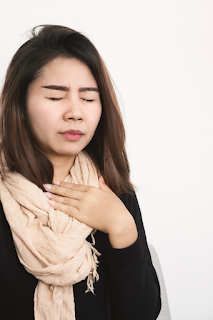Dysphagia is a condition that affects the ability to swallow. It causes pain and discomfort, and in some cases, it can lead to further complications like choking and even aspiration. Life with a diagnosis is easier because you have an answer, but the reality is still difficult to face. This guide discusses a selection of common symptoms and some great ways for managing them.
Painful Swallowing
The most described symptom caused by this condition is painful swallowing. It is bound to be the thing that sends you to the doctor’s office in the first place, and it will be one of the first signs you notice that leads you to think that something is not quite right in your body. It happens with both eating and drinking, and it can be combatted in a few simple ways. First, explore a straightforward dysphagia solution from SimplyThick that makes drinks and some foods thicker, and therefore easier to physically swallow. Secondly, think about what you are eating or drinking and how it might cause problems. For example, cold food like ice cream might melt and become thinner in the esophagus which in turn creates a risk for aspiration.
Difficulties with Chewing
It is also typical for dysphagia patients to struggle with mastication. This is because all of the muscles involved in the physical act of chewing like the lips, tongue, and jaw all become weaker as the condition progresses. These difficulties may lead to you not being able to enjoy mealtimes, and even avoiding eating until absolutely necessary. A big risk here is malnutrition and unwanted weight loss, so instead consider how you access meals. The best trick is to embrace smaller-than-bitesize portions and softer or even pureed foods on your plate.
Heartburn
Heartburn occurs when stomach acid is pushed back up towards the throat and is often quite painful. This level of discomfort is yet another deterrent to eating and drinking a balanced diet, but there are distinct triggers that you can avoid to make life easier. Coffee, spicy foods, and alcohol are typical causal factors behind a heartburn episode and will cause an episode if eaten or drunk. It is also intensified by external factors such as being overweight or smoking, two things that also make dysphagia worse.
Hoarseness and Dry Mouth
These two symptoms are often reported too. A sore throat and a hoarse voice are typical and can’t always be avoided. They could be made worse by a dry mouth, or the two will sometimes happen independently. While there is no actual fix for these symptoms, it is recommended that you avoid things like caffeine, fatty foods, chocolate, carbonated beverages,and spices as these tend to create a bigger problem. If this symptom continues or gets worse, do not hesitate to talk to your doctor to see if there are any medical recommendations they can make depending on your specific condition.
Dysphagia has many symptoms that create problems for anyone suffering from the condition. It is vital to determine the reasons behind the problems so that your path to healing is the most appropriate one.



Post a Comment